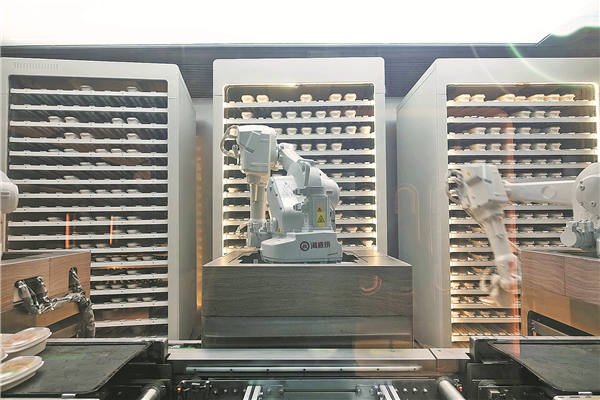January 5, 2023
BEIJING – Increasing number of eateries put automation on the menu, report Wang Qian and Liu Kun in Wuhan.
As COVID-19 restrictions are lifted across the country, Li Xianghui knows it will be challenging for traditional restaurants to handle the increasing number of diners. But for his restaurants, things are different.
Owning four eateries in Wuhan, Hubei province, Li “employs” an array of cooking machines, which can operate tirelessly day and night. Packed in kits, all dishes are semifinished and can be served within minutes after they are put into the machines.
“Automation is the future for the catering industry. It can avoid pressure from labor costs in running a traditional restaurant and increase efficiency,” Li says.
“There is a standardized process by the machines, which can guarantee consistency in the taste of each order,” the 36-year-old man adds.
The cooking machine can make about 2,000 recipes, according to Li.
Once seated, diners scan a QR code and use an app to make their meal selection and pay. With the only waiter putting the semifinished food kit into the machine, the meal will be served in minutes.

Mechanical catering at Haidilao hotpot “smart” restaurant at Nanjingnan Railway Station in Nanjing, Jiangsu province. [Photo provided to China Daily]
What’s more, the robot “chef” has attracted an increasing number of diners since the restaurant’s opening in October.
“The taste is good and the price is not expensive,” a regular customer, surnamed Xu, says.
With such eateries springing up across the country, robot “chefs” are not only taking over restaurants but also coming into homes.
Behind the scenes is the country’s growing service robotics industry, which, as of 2021, had a market value of more than 58 billion yuan ($8.3 billion), according to the Statista database portal. The industry is projected to reach a value of 291 billion yuan by 2027.
“Service robots are constantly improving the level of social services in catering, retail, logistics distribution, medical rehabilitation and other fields,” says Wang Hong, an official with the Ministry of Industry and Information Technology.
The “smart” restaurant for the Beijing 2022 Winter Olympic Games may indicate what the future of the food service industry looks like. With no human chefs and waiters, robots took charge of everything.
In 2018, popular hotpot brand Haidilao opened its first “smart “restaurant. The kitchen, equipped with two rows of robotic arms, can automatically collect prepackaged dishes from cold storage.
For Li, it is only a matter of time before such machinery becomes a common sight in kitchens.
“The labor shortage caused by the pandemic is accelerating this process,” Li says, adding that he plans to open 20 more eateries this year, staffed by robot “chefs”.
According to an annual report on the country’s restaurant industry released by China Hospitality Association, a shortage of labor is a challenge faced by many business operators.

A robot “waitress” delivers food to customers at a restaurant in Fuzhou, Fujian province. [Photo provided to China Daily]
On Dec 12, the Xidan Mingzhu Market in Beijing announced that it was forced to shorten operating hours because of a shortage of staff.
To seize upon the business opportunity, various domestic robot manufacturers, including Siasun, Uditech and Keenon, have become increasingly more engaged in research and development in the area of service robotics in recent years.
Across the world, robot “chefs “are set to take over cooking in restaurants and technology advances are taking them a step further.
Working in collaboration with domestic appliances manufacturer Beko, researchers from the University of Cambridge have trained their robot “chef” to assess the saltiness of a dish at different stages of the chewing process, imitating a similar process in humans, according to their research published in the journal Frontiers in Robotics and AI.
Their results could be useful in the development of automated or semiautomated food preparation by helping robots to learn what tastes good and what doesn’t, making them better “cooks”.
“Most home cooks will be familiar with the concept of tasting as you go — tasting a dish throughout the cooking process to check whether the balance of flavors is right,” Grzegorz Sochacki from Cambridge’s Department of Engineering, the paper’s first author, told Frontiers in Robotics and AI. “If robots are to be used for certain aspects of food preparation, it’s important that they are able to ‘taste’ what they’re cooking.”

Customers take food at a restaurant that can automatically weigh and calculate the price of dishes at Chongqing International Logistics Hub Park in March 2021. [Photo provided to China Daily]

A customer collects food from a device at a “smart” restaurant in the main media center during the Beijing 2022 Winter Olympic Games in January last year. YONHAP NEWS AGENCY


